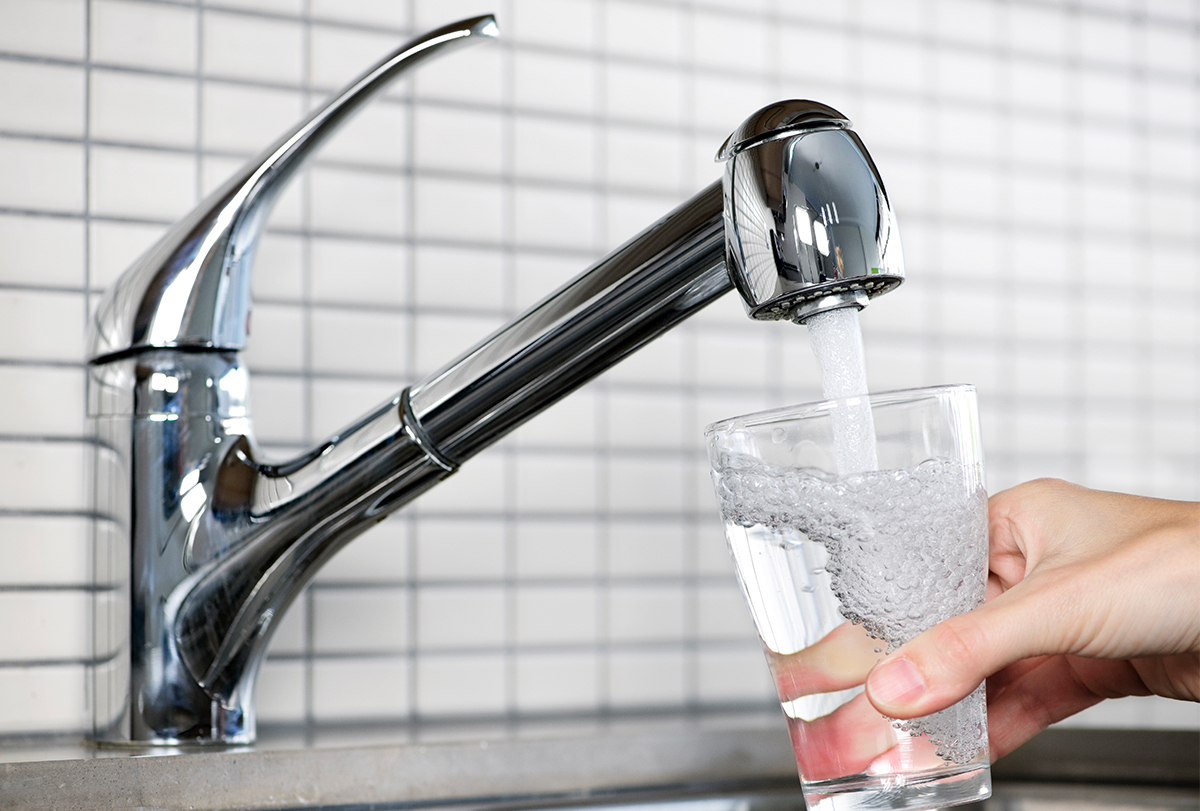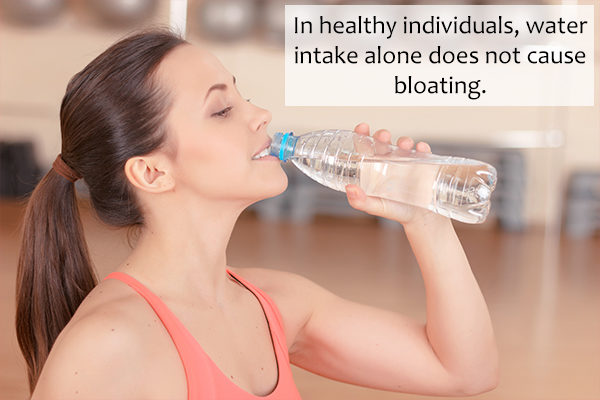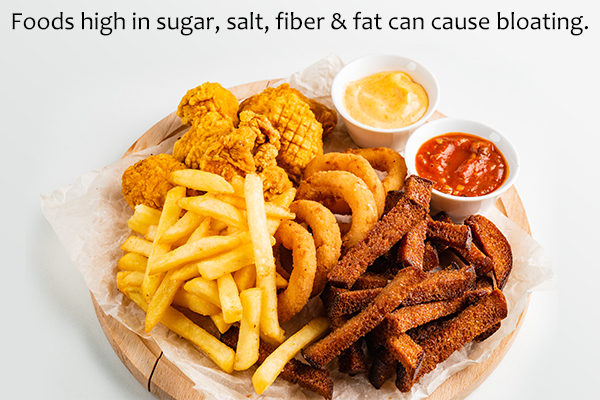In this article:
Bloating is used to describe a feeling of fullness or distention in the abdominal area. It is often associated with gastrointestinal disorders but can manifest in healthy individuals also. (1)

Functional bloating refers to bloating in the absence of gastrointestinal disease. (2) It is usually intermittent and can vary throughout the day. It may be a solitary symptom or can be accompanied by mild abdominal discomfort or minor bowel changes.
Although there is often a perception of increased abdominal girth, there might not be a measurable difference. (3) Bloating must be the main abdominal complaint to meet the criteria of functional bloating.
Does Drinking Too Much Water Cause Bloating?

It is very important to distinguish between abdominal bloating and edema as these conditions are due to different mechanisms. In healthy individuals, water intake alone does not cause bloating.
Water retention or edema is normally caused by excessive salt intake. Due to the high sodium levels in the blood, the body starts storing water in the superficial tissues, particularly observed in the lower extremities.
While edema is not caused by excess water consumption, drinking copious amounts of water at once can cause your stomach to distend in the same way eating a large meal would. In addition, drinking water quickly can cause you to ingest more air (aerophagia), which can create a feeling of fullness. This is known as abdominal bloating and is usually a temporary issue.
Edema is swelling caused by the retention of fluids in the superficial body tissues, most commonly seen in the lower extremities. Edema can be caused by drinking too much water and usually requires medical evaluation to determine the cause.
How Common Is Bloating?
Abdominal bloating is one of the most commonly reported gastrointestinal symptoms. Studies have shown that as high as 30% of the general population experiences this problem. (3)
Some studies on irritable bowel syndrome (IBS) suggest that bloating is more common in women than men. (3) Individuals with functional gastrointestinal disorders show an increase in doctor’s visits and miss more school days and workdays. (3)(4) This demonstrates that bloating can be a debilitating symptom. However, due to its benign nature, the data is limited in healthy individuals.
Bloating is more commonly seen in patients with other gastrointestinal issues. Digestive system disorders, such as dyspepsia, IBS, and inflammatory bowel disease, often present with bloating. (3)
Most of the data available on bloating are from patients with IBS. Bloating has been reported in a high percentage of these patients and can develop for multiple reasons. The majority of patients with IBS report bloating as one of their worse symptoms. (5)
Abnormalities in gut motility, increased visceral sensitivity, and impaired digestion can all contribute to bloating in these patients. Bloating tends to be chronic, persistent, and accompanied by other symptoms when associated with other bowel disorders.
Common Causes of Bloating

Bloating is usually caused by too much gas, liquids, or solids in the digestive system. (3) Conditions that introduce excess gas impede the proper elimination of digestive by-products or cause water retention, which can worsen the symptoms.
Common causes of bloating include a poor diet, food intolerances, hormonal fluctuations, and constipation.
1. Consuming foods high in sugar, salt, fiber, and fat
Carbohydrates, such as fructose and sorbitol, are incompletely digested in the small intestine, pass down to the colon, and release excess gas as they are broken down. (3)
Some trials have shown that high-fiber and high-salt diets increase bloating as well. Fiber, whether soluble or insoluble, is not digestible, so it can increase bulk in the gut. Too much fiber or an abrupt increase in fiber can cause bloating. (6)
Salt attracts water, which can then lead to water retention in the intestinal lumen and abdominal vasculature. This can cause abdominal expansion and can worsen the symptoms.
Foods high in fat take longer to digest, which prolongs the sensation of fullness. (3) High-fat foods will not only sit in your digestive tract for a longer period but will also continue to release gases as they are digested.
Some foods also release gases during digestion, such as beans and cruciferous vegetables. (3) A high intake of these types of foods can lead to excess bloating.
2. Food intolerances
Food intolerances make it difficult for individuals to fully digest some foods. The retention of undigested substances and the gas produced trying to break them down can worsen bloating.
Even people without specific food intolerances, such as lactose and gluten, can have a difficult time digesting some foods. This can vary from one individual to the next.
3. Hormonal changes
Hormonal changes can also cause bloating. Women often report symptoms of bloating before and during menstruation. (3) This is thought to be due to neurohormonal changes that cause water retention in the abdominal cavity. However, the mechanism is not fully understood. (3)
4. Constipation
Constipation can cause distention and pressure in the lower gastrointestinal tract. In some studies, the incidence of bloating in constipated patients has been reported to be up to 80%. (3) It is easy to see how just a transient episode of constipation can lead to bloating in a healthy individual.
Symptoms of Bloating
Symptoms of bloating include:
- A feeling of abdominal fullness
- A perception of abdominal distention
Other associated symptoms are:
Tips to Relieve Bloating

The best way to avoid bloating is to find the underlying cause and to address it. (2) Keeping a food diary will help identify foods that worsen the symptoms.
Eliminating certain food groups for a few weeks and observing changes are another way of finding any culprits. Bloating can be multifactorial, so often, a comprehensive approach works best. (2)
Some simple interventions to reduce bloating include: (3)
- Avoiding foods high in sugar, salt, and fats
- Avoiding artificial sweeteners, especially sugar alcohols
- Eliminating gas-producing foods, such as beans, broccoli, Brussels sprouts, and other cruciferous vegetables
- Avoiding carbonated beverages
- Taking an over-the-counter medication, such as simethicone or Beano
- Exercising
Additional Tips
If you believe your bloating is due to water retention, the best remedy is to drink more water. Although it seems counterintuitive, drinking more water can help bloating.
Hydration has many positive effects on the body. Water aids in digestion, helps eliminate excess salt and toxins, and alleviates constipation. If you are not a fan of drinking water, there are other ways to increase your fluid intake.
Drinking flavored water, tea, and juices will help. Eating fruits with high water content, such as watermelon and cucumbers, is another way to get extra fluids into your system. Remember to avoid drinks that are high in sugar and have artificial sweeteners.
Complications: When to Seek Medical Care
Bloating that is intermittent is usually benign. However, if conservative measures do not alleviate your symptoms or your symptoms are severe, you might have to consider that your bloating is a sign of an underlying medical condition.
It is time to seek medical care if you experience any alarming features such as:
Final Word
Although bloating is a bothersome symptom, it is usually short-lived and benign. Normally, conservative measures can lessen the discomfort. However, if bloating is so severe that it interferes with daily activities, seek a medical opinion.
- Was this article helpful?
- YES, THANKS!NOT REALLY


